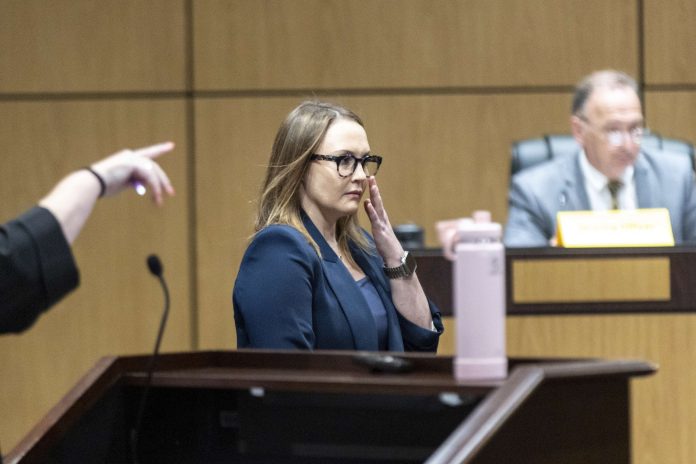
By Jeff Amy
Associated Press
MARIETTA, Ga. (AP) — A Georgia public school teacher took the stand Thursday trying to reverse her firing after officials said she improperly read a book on gender fluidity to her fifth grade class.
Katie Rinderle had been a teacher for 10 years when she got into trouble in March for reading the picture book “My Shadow Is Purple” at Due West Elementary School in suburban Atlanta’s Cobb County.
The case has drawn wide attention as a test of what public school teachers can teach in class, how much a school system can control teachers and whether parents can veto instruction they dislike. It comes amid a nationwide conservative backlash to books and teaching about LGBTQ+ subjects in school.
Officials in Cobb County, Georgia’s second-largest school district, argue Rinderle broke the school district’s rules against teaching on controversial subjects and fired her after parents complained.
Rinderle countered that reading the book wasn’t wrong, testifying that she believed it “to be appropriate” and not a “sensitive topic.” She argued Thursday that the book carries a broader message for gifted students, talking “about their many interests and feeling that they should be able to choose any of their interests and explore all of their interests.”
Cobb County adopted a rule barring teaching on controversial issues in 2022, after Georgia lawmakers earlier that year enacted laws barring the teaching of “divisive concepts” and creating a parents’ bill of rights. The divisive concepts law, although it addresses teaching on race, bars teachers from “espousing personal political beliefs.” The bill of rights guarantees that parents have “the right to direct the upbringing and the moral or religious training of his or her minor child.”
Goodmark argued that a prohibition of “controversial issues” is so vague that teachers can never be sure what’s banned, saying the case should be dismissed.
The hearing took place under a Georgia law that protects teachers from unjustified firing. A panel of three retired school principals will make a recommendation on whether to fire or retain Rinderle, but the school board in the 106,000-student district will make the final decision. Rinderle could appeal any firing to the state Board of Education and ultimately into court.



















